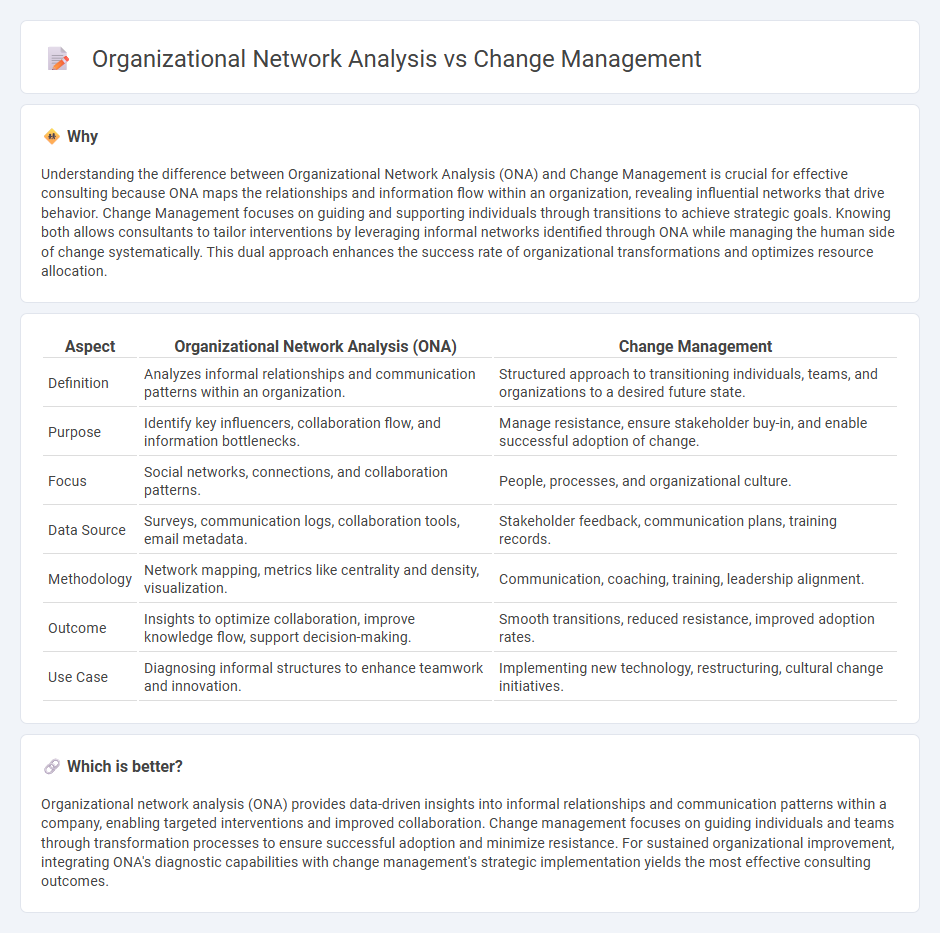
Organizational Network Analysis (ONA) maps and evaluates the informal relationships and communication patterns within a company, enhancing insights into collaboration and knowledge flow. Change Management focuses on guiding individuals and teams through transitions to achieve successful adoption of new processes, technologies, or cultural shifts. Explore how integrating ONA with Change Management can drive more effective organizational transformation and resilience.
Why it is important
Understanding the difference between Organizational Network Analysis (ONA) and Change Management is crucial for effective consulting because ONA maps the relationships and information flow within an organization, revealing influential networks that drive behavior. Change Management focuses on guiding and supporting individuals through transitions to achieve strategic goals. Knowing both allows consultants to tailor interventions by leveraging informal networks identified through ONA while managing the human side of change systematically. This dual approach enhances the success rate of organizational transformations and optimizes resource allocation.
Comparison Table
| Aspect | Organizational Network Analysis (ONA) | Change Management |
|---|---|---|
| Definition | Analyzes informal relationships and communication patterns within an organization. | Structured approach to transitioning individuals, teams, and organizations to a desired future state. |
| Purpose | Identify key influencers, collaboration flow, and information bottlenecks. | Manage resistance, ensure stakeholder buy-in, and enable successful adoption of change. |
| Focus | Social networks, connections, and collaboration patterns. | People, processes, and organizational culture. |
| Data Source | Surveys, communication logs, collaboration tools, email metadata. | Stakeholder feedback, communication plans, training records. |
| Methodology | Network mapping, metrics like centrality and density, visualization. | Communication, coaching, training, leadership alignment. |
| Outcome | Insights to optimize collaboration, improve knowledge flow, support decision-making. | Smooth transitions, reduced resistance, improved adoption rates. |
| Use Case | Diagnosing informal structures to enhance teamwork and innovation. | Implementing new technology, restructuring, cultural change initiatives. |
Which is better?
Organizational network analysis (ONA) provides data-driven insights into informal relationships and communication patterns within a company, enabling targeted interventions and improved collaboration. Change management focuses on guiding individuals and teams through transformation processes to ensure successful adoption and minimize resistance. For sustained organizational improvement, integrating ONA's diagnostic capabilities with change management's strategic implementation yields the most effective consulting outcomes.
Connection
Organizational Network Analysis (ONA) provides critical insights into informal communication patterns and influence within a company, enabling change management strategies to target key stakeholders and optimize adoption. By mapping relationships and identifying change agents through ONA, consultants can tailor interventions that minimize resistance and accelerate transformation efforts. Integrating ONA into change management increases the effectiveness of initiatives by aligning structural and cultural dynamics within the organization.
Key Terms
**Change Management:**
Change management involves systematically guiding individuals and teams through transitions to achieve desired organizational outcomes, emphasizing communication, stakeholder engagement, and resistance mitigation. It relies on structured methodologies like ADKAR or Kotter's 8-Step Process to ensure smooth adoption of change initiatives and business transformation. Explore how integrating organizational network analysis can enhance change management effectiveness and improve overall success rates.
Stakeholder Engagement
Change management emphasizes structured communication and involvement strategies to align stakeholders with organizational goals, ensuring smooth transitions during change initiatives. Organizational Network Analysis (ONA) maps relationships and informal networks, identifying key influencers and hidden stakeholders to optimize engagement and accelerate acceptance. Explore deeper insights into leveraging ONA for enhanced stakeholder engagement in change management by learning more.
Communication Plan
Change management emphasizes structured communication plans to ensure stakeholder alignment and smooth transitions during organizational shifts. Organizational Network Analysis (ONA) identifies informal communication patterns and key influencers to optimize information flow and enhance collaborative engagement. Explore detailed strategies on leveraging both approaches for effective communication planning.
Source and External Links
What is Change Management? Definition & Process - WalkMe - Change management is a coordinated approach handling the human aspects of organizational change through clear vision, training, support, resistance management, and continuous monitoring to ensure changes are sustained and embedded into culture and processes.
What is Change Management? - IBM - Change management involves a structured method to communicate and implement change by supporting people and systems across the organization, allowing smoother adoption of new processes or technology driven by business needs like digital transformation or leadership changes.
What is Change Management? Organizational, Process ... - ASQ - Change management includes defining and communicating change clearly, assessing risks, planning with a project-based framework, engaging leadership and employees, and establishing metrics and training to drive effective and responsive organizational transitions.
 dowidth.com
dowidth.com